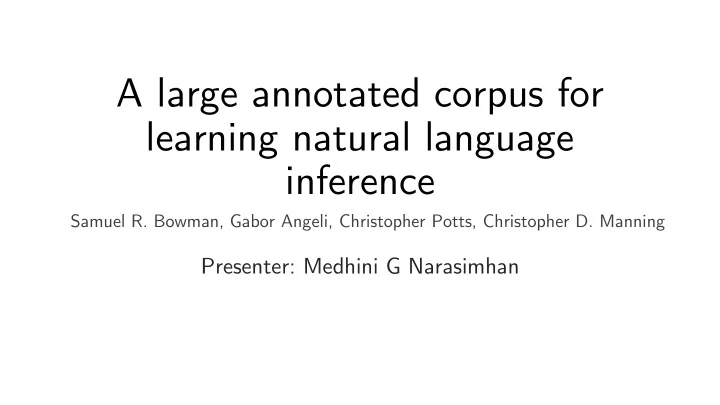

A large annotated corpus for learning natural language inference Samuel R. Bowman, Gabor Angeli, Christopher Potts, Christopher D. Manning Presenter: Medhini G Narasimhan
Outline • Entailment and Contradiction • Examples of Natural Language Inference • Prior datasets for Natural Language Inference • Shortcomings of previous work • Stanford Natural Language Inference Corpus • Data Collection • Data Validation • Models on this dataset • Conclusion
Entailment and Contradiction • Entailment : The truth of one sentence implies the truth of the other sentence. “It is raining heavily outside.” entails “ The streets are flooded.” • Contradiction : The truth of one sentence implies the falseness of the other. “It is cold in here.” contradicts “It is hot in here.” • Understanding entailment and contradiction is fundamental to understanding natural language. • Natural Language Inference: Determining whether a natural language hypothesis can justifiably be inferred from a natural language premise.
Examples of Natural Language Inference Neutral A woman with a green headscarf, blue shirt and a very big grin. The woman is young. Entailment A land rover is being driven across a river. A Land Rover is splashing water as it crosses a river. Contradiction An old man with a package poses in front of an advertisement. A man walks by an ad.
Objective To introduce a Natural Language Inference corpus which would allow for the development of improved models on entailment and contradiction and Natural Language Inference as a whole.
Prior datasets for NLI • Recognizing Textual Entailment(RTE) challenge tasks: • High-quality, hand-labelled data sets. • Small in size and complex examples. • Sentences Involving Compositional Knowledge (SICK) data for the SemEval 2014: • 4,500 training examples. • Partly automatic construction introduced some spurious patterns into the data. • Denotation Graph entailment set: • Contains millions of examples of entailments between sentences and artificially constructed short phrases. • Labelled using fully automatic methods, hence noisy.
Issues with previous datasets • Too small in size to train modern data-intensive wide-coverage models. • Indeterminacies of event and entity coreference lead to indeterminacy concerning the semantic label. • Event indeterminacy: • A boat sank in the Pacific Ocean and A boat sank in the Atlantic Ocean . • Contradiction if they refer to the same event, else neutral. • Entity indeterminacy: • A tourist visited New York and A tourist visited the city. • If we assume coreference, this is entailment, else neutral.
Stanford Natural Language Inference corpus • Freely available collection of 570K labelled sentence pairs, written by humans doing a novel grounded task based on image captioning. • The labels include entailment , contradiction , and semantic independence . • Image captions would ground examples to specific scenarios and overcome entity and event indeterminacy. • Participants allowed to produce entirely novel sentences which led to richer examples. • A subset of the resulting sentences were sent to a validation task in order to provide a highly reliable set of annotations.
Data Collection • Premises obtained from Flickr30K image captioning dataset. • Using just the captions, workers were asked to generate entailing, neutral and contradictive examples. A female tennis player in a purple top and A man is snow boarding and jumping off of a A motorcycle races. black skirt swings her racquet. snow hill. A motorcycle rider in a white helmet leans A female tennis player preparing to serve the A person in a black jacket is snowboarding into a curve on a rural road. ball. during the evening. A motorcycle rider making a turn. A woman in a purple tank top holds a tennis A silhouette of a person snowboarding Someone on a motorcycle leaning into a turn. racket, extends an arm upward, and looks up. through a pile of snow. There is a professional motorcyclist turning a A woman wearing a purple shirt and holding A snowboarder flying off a snow drift with a corner. a tennis racket in her hand is looking up. colourful sky in the background. Girl is waiting for the ball to come down as The person in the parka is on a snow board. she plays tennis.
Data Collection • The sentences in SNLI are all descriptions of scenes, and photo captions. • Reliable judgments from untrained annotators • Logically consistent definition of contradiction . • Issues of coreference greatly mitigated. For example, “A dog is lying in the grass”, the main object is the dog.
Data Validation • Measure the quality of corpus and collect additional data for test and development sets. • Validation is done by asking four annotators to label the same pair, this gave five labels per pair. • Based on their labelling skills, 30 trusted workers were picked. • Sentence pair assigned a gold label if one of the three labels were chosen by at least three of the five annotators. • Only sentence pairs with gold label used during model building.
Stanford Natural Language Inference corpus
Models and Results on SNLI • Excitement Open Platform Model • Edit distance algorithm: Tunes the weight of the three case insensitive edit distance operations. • Simple lexical based classifier. • Lexicalized feature-based classifier model • BLEU Score. • Length difference. • Overlap between words. • Indicator for every unigram and bigram. • Cross unigrams. • Cross bigrams.
Models and Results on SNLI • Neural network sequence model • Generate vector embedding of each sentence. • Train classifier to label the vectors. • Two sequence embedding models: Plan RNN and LSTM RNN. • Embeddings initialized with GloVE vectors. • Lexicalized model performs better.
Conclusion • SNLI draws fairly extensively on common sense knowledge. • Hypothesis and premise sentences often differ structurally in significant ways. • Sentences collected are largely fluent, correctly spelled English. • Basic models were introduced which have been outperformed. • Future directions – Using entailment and contradiction pairs to generate question answers on Flickr30k.
Questions?
Thank You!
Recommend
More recommend